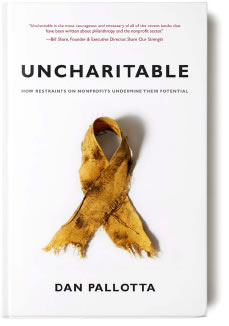
Uncharitable is for students, philanthropists, nonprofit executives, institutional funders, donors, and anyone who cares about the great causes of our time.
It ventures where no other book on the nonprofit sector has dared to go. Where other well-intended books suggest ways to improve performance within the existing nonprofit paradigm, Uncharitable argues that the paradigm itself is the problem, and calls into question our fundamental canons about charity. Its insurgent thesis is that society’s nonprofit ethic undermines our ability to eradicate great problems, and, ironically, puts charity at a severe disadvantage to the for-profit sector at every level. We have two rule books; one for charity, and one for everything else. This economic apartheid denies charity the powerful tools of capitalism, while everyone else is permitted to use them without restraint. This all occurs in the name of charity, but it is a charity whose principal benefit flows to the for-profit sector. For example:
- Compensation: We allow the for-profit sector to pay people millions, but don’t want anyone paid a high salary in charity. This sends most of our top talent directly into the for-profit sector and gives our youth mutually exclusive choices between making a difference and making money.
- Advertising: We let Apple and Coca-Cola inundate us with advertising, but don’t want important causes “wasting” donations on paid advertising. As a result, the voices of our great causes are largely muted while consumer products get lopsided access to our attention, 24 hours a day.
- Vision: We let for-profit companies invest in the long-term, but want our charitable donations spent immediately in this fiscal year to help the needy. That means charities can’t set aside funds to develop long-term solutions.
- Learning: We aren’t upset when Paramount makes a $200 million movie that fails, but if a charity experiments with a bold new fundraising event that disappoints we want heads to roll. So our charities are petrified of trying any bold new endeavors and are unable to develop the powerful learning curves the for-profit sector can.
- Capital: We let for-profit companies raise massive capital in the stock market by offering investment returns, but we forbid the payment of a financial return in charity. Thus the for-profit sector monopolizes the capital markets while charities are left to beg for donations.
At a tactical level, Uncharitable also shows how the question we’ve all been trained to ask to evaluate a charity – “What percentage of my donation goes to the cause?” – is deeply flawed, gives dangerously misleading information, and can reward charities that provide poor service and hurt those that are doing the most good. It also shows how these measures force charities into a fearful and perpetually cautious posture, and prohibits them from pursuing their boldest dreams of a better world. The book also includes a case study on Pallotta TeamWorks.
Uncharitable is a manifesto that puts a new cause on the map - equal economic rights for charity. Its greatest achievement may be to awaken society to the fact that they are so unequal to begin with. The book has been endorsed by former Harvard President Derek Bok, former U.S. Senator Gary Hart, Time Magazine's 1997 Man of the Year, Dr. David Ho, and by the heads of Save the Children, Oxfam America, Southern Poverty Law Center, X PRIZE Foundation, GOOD Magazine, Operation Hope, Albany State University, the UCLA AIDS Institute and by prominent academics in the field.

